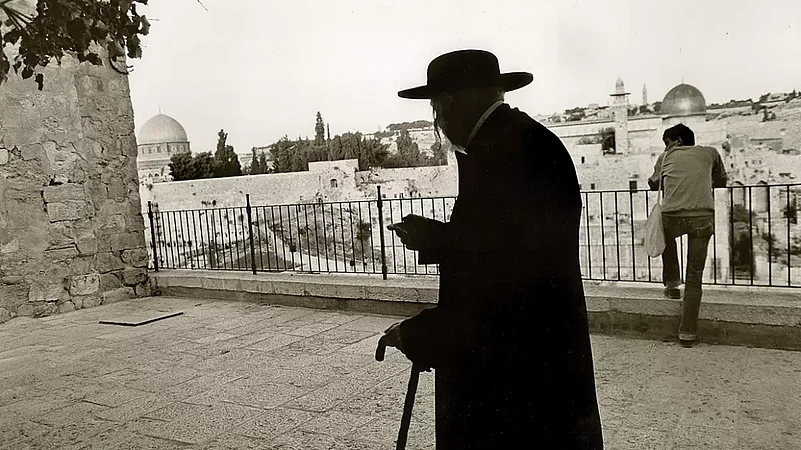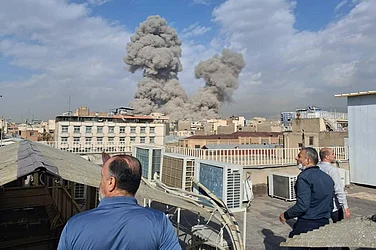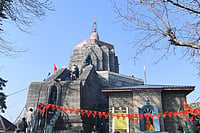It’s been a year since we were in Israel, all my family, for a holiday. I am compelled to write now because I just saw videos of a bombed down Gaza. I am looking for the face of my friend Taufiq, who lives in Gaza. I dread seeing his face covered in blood, or his maimed body.
***
Last year, we went to visit Bethlehem, the birthplace of Jesus, in the West Bank. Avi, our Jewish guide, said that Israel ended here, and he could not come with us. We were on our own. This brought a thrill as well as fears. We entered a tunnel-like hall with bright white lights, red guidelines and signs in Hebrew and Arabic. I hurried down, my footsteps echoing, my heartbeat loud. I have crossed borders many times—some difficult ones like India-Pakistan on foot—but this didn’t feel like a border. No one at either end of the tunnel checked our passports or questioned us.
Tall metal gates opened into the West Bank. Narrow roads wound around hills, their limestone slopes swathed with creamy stone buildings. The streets bustled, packed with shops. Men, women and children went about their lives, buying, selling, talking, and laughing. A faded poster on a graffiti wall mentioned a young boy killed in gunfire in 2016. Our taxi sped up and down the hills towards the church where Jesus was born.
John, our Palestinian Christian guide, hummed Hindi songs to make us feel home. He said, “I go to Jerusalem on Christmas.” He didn’t have a permit for other days. The distance between Bethlehem and Jerusalem is 11 km—a border that had let my family through; kept its own people apart.
The Bethlehem church was sprawled on a hill. It was made of yellowish limestone, like most buildings in Jerusalem. Inside, red limestone pillars held up a high wooden ceiling, hymns echoing off its corners. I suddenly remembered Taufiq, my Palestinian friend from college. Taufiq had studied engineering with me in Kashmir in the late 1980s. I messaged him excitedly that I was in Palestine, and could we meet?
Taufiq messaged, “Dear brother, I LIVE IN GAZA. Wish you a happy visit and a good stay.” He sounded abrupt. I didn’t know what to say.
Frankincense filled the air as we stepped into a small cave in the church. In my Roman Catholic school in Kashmir, I had seen paintings of baby Jesus on a haystack, and of Mother Mary holding Jesus in her lap. It was surreal stepping into those paintings, touching the spot where Jesus was born, and feeling the warmth of its oil lamps. A hymn rose into the air, like a lullaby or a Hindu temple chant. A priest offered me an olive oil lamp for blessings. I dipped my finger in the warm oil and touched everyone’s heads.
Outside the church, there were orange trees, laden with ripening fruit. We took photos and sat under the trees. Two Palestinian men began to hover around us, trying to sell us black-and-white cotton keffiyehs.
“Brother, buy from us.”
“We don’t need them, thanks,” I said.
“Help our children, brother.”
My wife bought two keffiyehs for our sons.
“Buy these also.” The man thrust a bundle of cloth pouches at us.
“No,” we said, and disappeared into the taxi.
The man threw the bundle into the taxi, saying, “Gift from me, sister.”
We stopped the car and bought all the pouches. The pouches had scenes from the Bible, Jerusalem and Bethlehem, embroidered with gold thread.
I asked John about Gaza, and how far it was. John said that Palestinians in Gaza could not travel to the West Bank unless they travelled to Egypt; flew to Jordan; and then drove into West Bank. And that too only in a crisis! “It used to take people an hour in the past, but now it is many days and for most people, never.”
It was time to return to Jerusalem. John stopped the car a hundred metres from the tunnel and asked us to hurry. Swarms of young Palestinian men suddenly appeared from nowhere and walked briskly towards us. They looked rough; their clothes were soiled; and, all talked loudly, excitedly. We clutched each other’s hands.
“Who are they?” I asked John.
“Palestinian labourers who work in Jerusalem; they return in the evenings,” he said.
At the other end of the tunnel stood a young Israeli soldier—with a large gun and an American accent—asking us where we had been and where we were going in Israel. His questions made the border between Bethlehem and Jerusalem come to life. His gun evoked in me, an old fear.
***
Jerusalem has delightful bazaars, churches, synagogues and mosques. Avi walked us through its narrow streets into the Christian quarter and up the hill where Jesus was crucified. The school-time story of Jesus carrying a cross and stumbling up a hill became real. On a limestone wall was a depression where Jesus had placed his hand. I placed my hand there too. The stone was soft and cool. It had witnessed and forgiven the pain and the indignities of the past.
Lively music began to play. A guitar, mandolin, violin, saxophone and a darbuka drum played a Hebrew tune as two old men danced. A teenage boy carried a carved silver drum in his hands, his head draped in a white cloth with long threads hanging from its edges. It was his coming-of-age ceremony, the Bar Mitzvah. A group of old Christian pilgrims began to dance to the music too. “Mazel tov, mazel tov!”. Love swirled into the air, a few yards from where Jesus was put on a cross, nails driven into his body. In the Armenian quarter, I bought two misbahas, rosaries made of 33 black glass beads, for a Muslim friend who lives in Kashmir.
The Wailing Wall was a high and wide limestone wall, stuffed with paper notes with messages for God. Men and women touched the stones and cried. Behind the wall was the Al-Aqsa Mosque, the third-holiest place of the Muslims. We drifted towards the Muslim quarter of Jerusalem. An Arabic world unfolded with colourful olives, ground spices, cinnamon sticks, figs, dates, sage tea, bagels, hummus, falafel and baklava. Avi took us inside a Palestinian coffee shop. A small old man brought us coffee in a wired container.
I said, “Sheket,” which I thought was Arabic for sugar. The old man stared at me.
I said, “Sheket” loudly. He went still, fear on his face.
Avi laughed, “‘Sheket’ in Hebrew means ‘silence!’”
We all laughed. The coffee man laughed the loudest. The coffee had a refreshing fragrance of cardamom in it. The knafeh was sticky and delicious.
The layers of Jerusalem, like its limestone, are old and many. Its histories, like old people, sit by each other patiently, quietly. They blend and flow into its food, pottery, tapestry, carvings and rugs. We bought food trays; made of olive wood; and, hand painted ceramics.
The tomb of King David was in an underground chamber, where young rabbis chanted prayers, rocking as they recited. And right above them was the room where Jesus had his Last Supper with his 12 apostles. In its Gothic arches, and stained-glass windows, were painted verses from the Quran. A Mihrab, a Muslim prayer alcove, stood in the centre of a wall. The incense from King David’s tomb below rose and swirled into the Last Supper room, dancing around its pillars, laughing at the vagaries of humans.
The next day in Jerusalem, a taxi driver, Ahmed, drove us to Yad Vashem, the Holocaust Museum. On that day, somewhere in Israel, a Palestinian teenager was killed. “This is what happens every day,” said Ahmed. “This is our present and our future.”
The Holocaust Museum was a prism-shaped building, built into the side of a hill. Remnants of burnt coaches, melted train tracks, abandoned shoes, letters, striped clothes, starvations, expulsions, murders, and other horrors of European concentration camps stared at us. Young boys and girl cadets in khaki uniforms milled about, guided by their teachers, a dazed look on their faces. Halfway into the gut-wrenching walk, I wanted to run out and breathe.
The air outside was crisp, and pine trees swayed gently.
That evening we went to a Palestinian restaurant in East Jerusalem. I ate mansaf, mildly spiced lamb cooked in yogurt, and served on a bed of rice. It reminded me of Kashmiri yakhni. An old singer sang a soulful song in Hebrew near a tram track, playing on a keyboard. Young people sat in small groups under the autumn trees. Dominique Lapierre died that day—the writer who wrote O Jerusalem; a book that I had begun to read when I was 21. It was left unread in Kashmir because I had to flee. It would have gone up in flames when my home burnt down.
I remembered Taufiq. I scrolled through my old messages and saw a message that I had written to him about a year earlier. “Dear Taufiq, hope you are well. I saw you in a dream today, and we were all in Palestine. You were offering us dates and oranges, which we all shared. I don’t know the meaning of this pleasant dream, but I hope all is good with you.” Taufiq had replied, “Thanks a lot for your kind feeling. It is your true and honest thoughts for me to have a bright and decent life. Hopefully, we will meet in Palestine or India and spend some time remembering and living our friendship.”
***
On TV, I see Gaza collapsing, and children dying. A million Gazans are fleeing, as war burns their homes down. I send Taufiq a message, “Hope you and your family are fine. I am praying for your welfare.” Taufiq has not picked up my message. I can imagine him running away from his home, into the relentless deserts, with his family, looking for shelter—with dates and oranges in his hands to give to me.
(Note: Names have been changed for privacy)
(Views expressed are personal)
Sandeep Raina is a writer and novelist
(This appeared in the print as 'Bethlehem, Jerusalem And A Friend In Gaza')






















